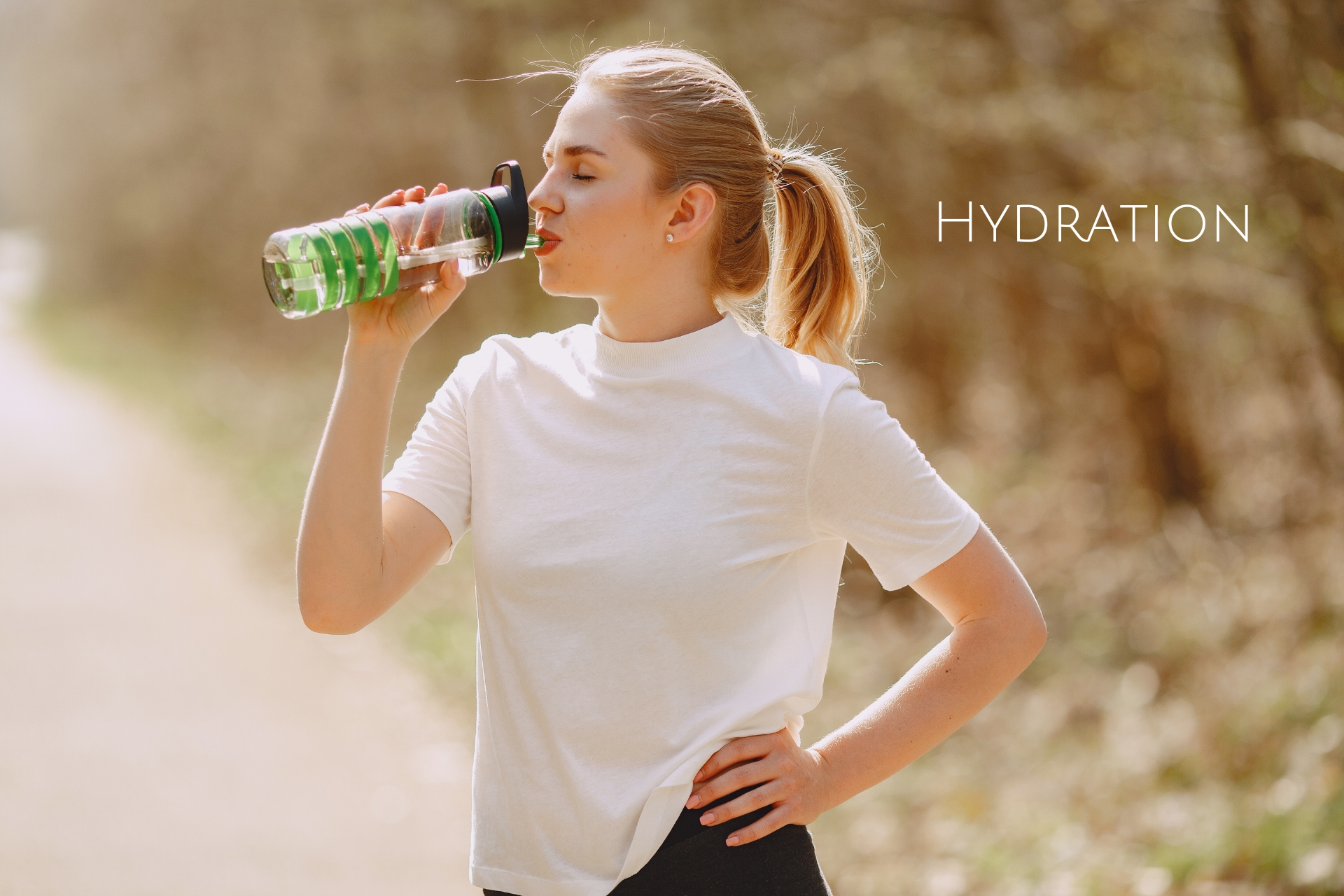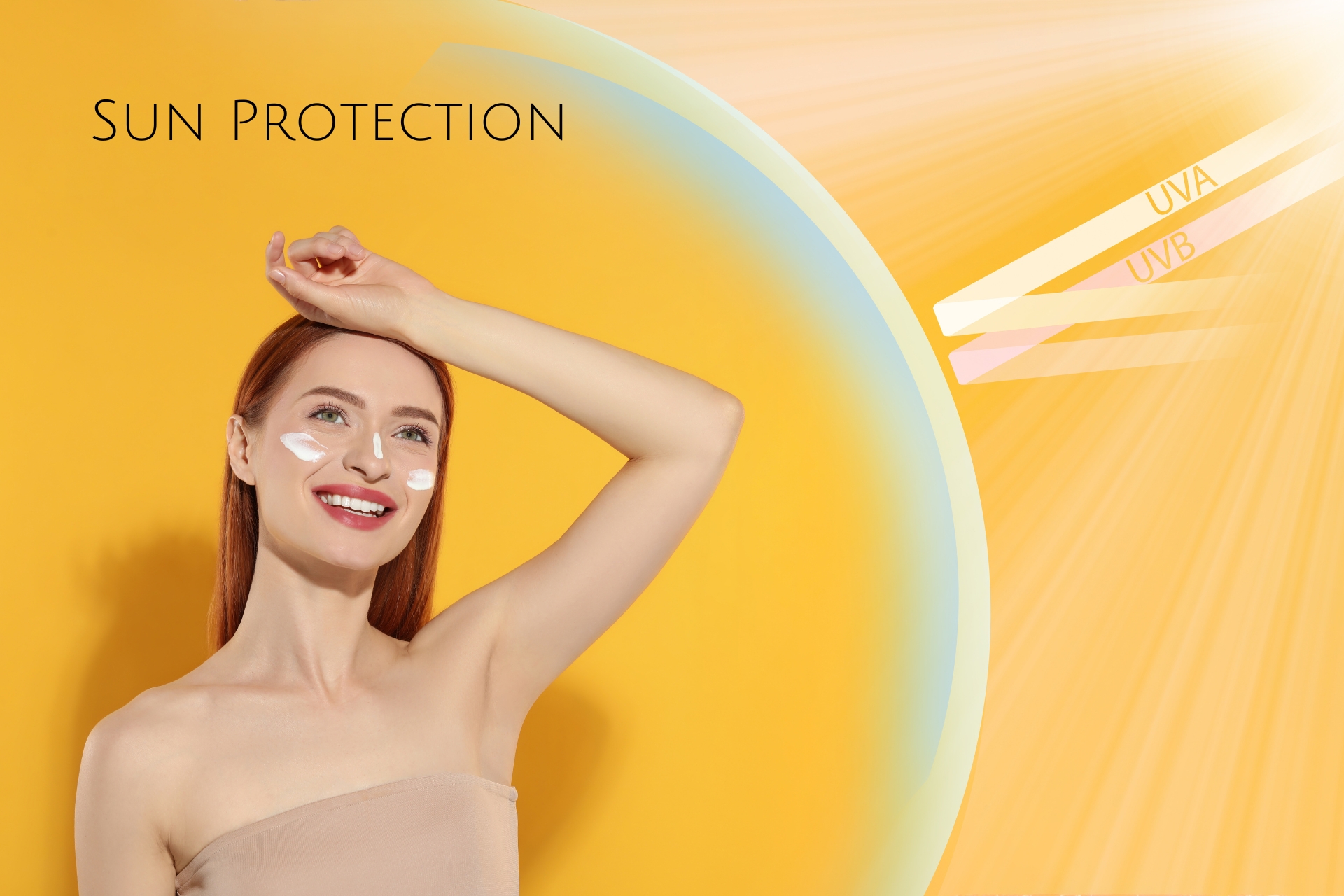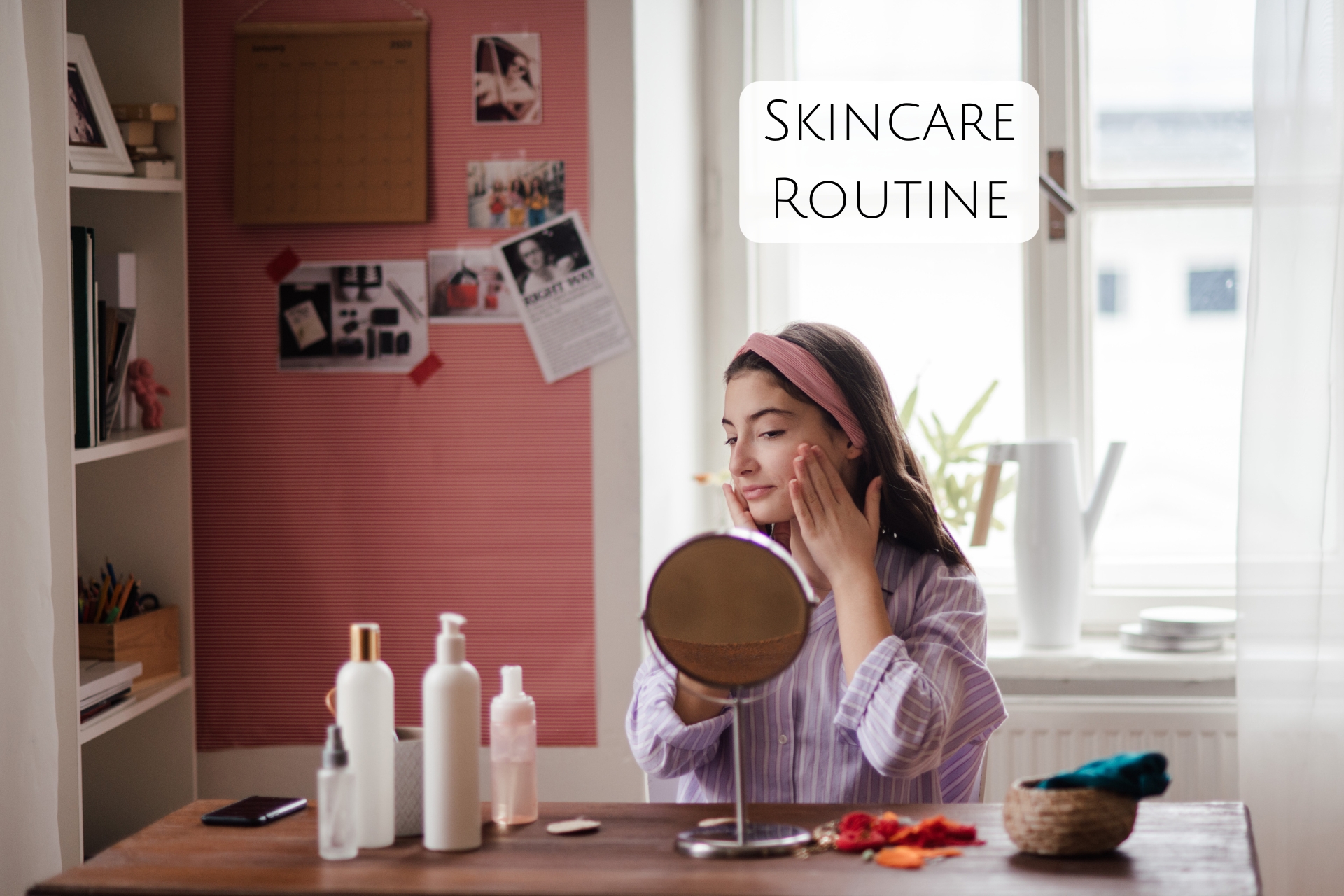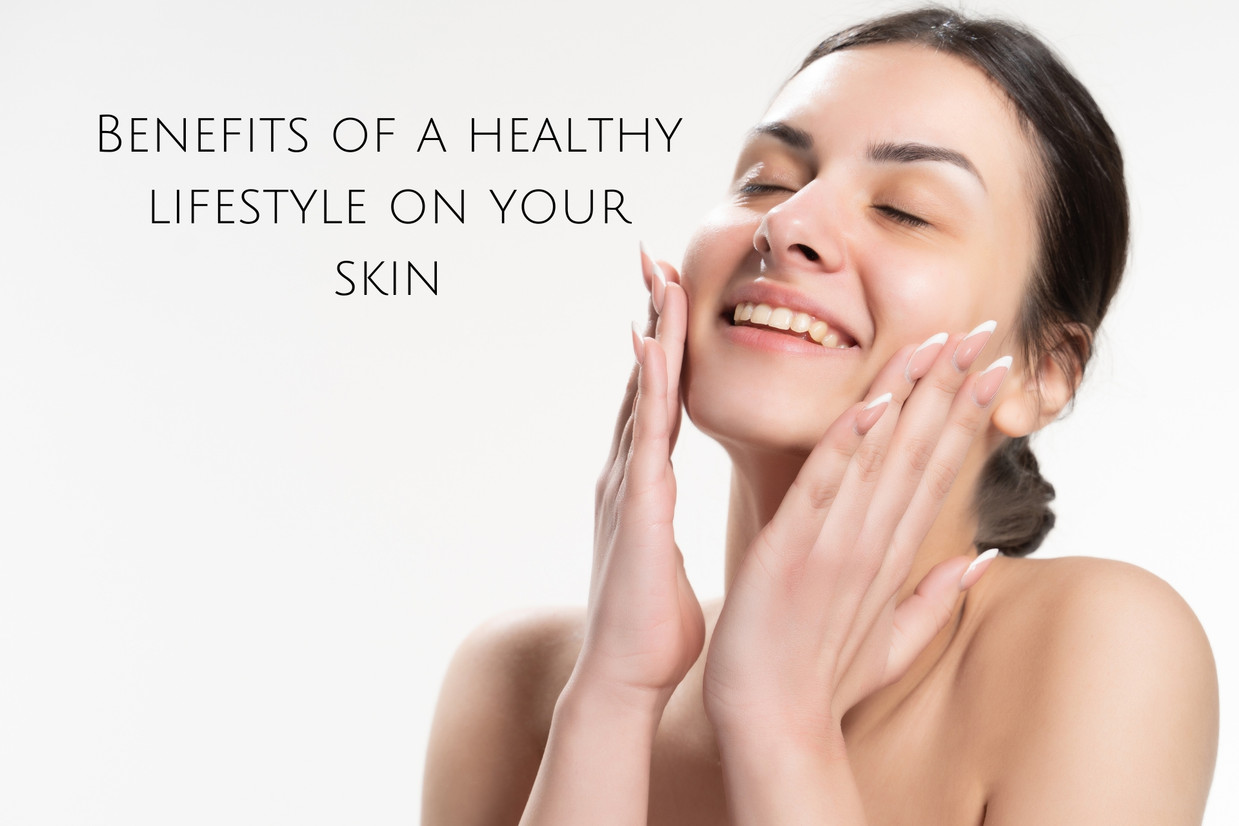Benefits of a healthy lifestyle on your skin
A healthy lifestyle can significantly impact the health and appearance of your skin in numerous ways:
Proper Nutrition:

Consuming a balanced diet rich in vitamins, minerals, antioxidants, and essential fatty acids is fundamental for optimal skin health. These nutrients play pivotal roles in supporting various skin functions, including cell repair, collagen synthesis, and protection against oxidative stress. Vitamins such as A, C, and E contribute to skin regeneration and repair, while minerals like zinc and selenium help maintain skin integrity and immune function. Antioxidants neutralize harmful free radicals, preventing cellular damage and premature aging. Essential fatty acids, particularly omega-3 and omega-6, bolster the skin's lipid barrier, improving hydration and elasticity. By nourishing the skin from within, a nutrient-dense diet promotes a radiant complexion, reduces inflammation, and enhances overall skin resilience against environmental aggressors.
Hydration:

Ensuring adequate water intake is paramount for maintaining optimal skin hydration, elasticity, and overall health. Proper hydration supports the body's innate detoxification mechanisms, aiding in the elimination of toxins and waste products that can compromise skin health. By keeping the skin well-hydrated, water helps to maintain its elasticity, preventing dryness, flakiness, and the formation of fine lines and wrinkles. Additionally, sufficient hydration promotes a clear and radiant complexion by flushing out impurities and supporting cell regeneration. Incorporating a consistent habit of drinking water throughout the day can contribute to skin suppleness, resilience, and a youthful appearance. Embrace hydration as a foundational element of your skincare routine, nurturing your skin from within and enhancing its natural vitality and luminosity.
Regular Exercise:

Exercise plays a pivotal role in promoting healthy circulation, which in turn facilitates the delivery of oxygen and essential nutrients to skin cells while effectively flushing out toxins. This enhanced blood flow encourages optimal skin health by supporting cell regeneration and rejuvenation processes. Furthermore, regular physical activity contributes to balanced hormone levels and reduces stress, both of which are key factors in preventing acne breakouts and promoting a more even skin tone. By engaging in consistent exercise routines, individuals not only stimulate their skin's natural renewal mechanisms but also cultivate overall wellness, fostering a radiant and clear complexion. Embracing exercise as a fundamental aspect of skincare not only enhances physical fitness but also nourishes the skin from within, resulting in a healthier and more vibrant appearance over time.
Adequate Sleep:

Quality sleep serves as a cornerstone for skin regeneration, repair, and rejuvenation, playing a pivotal role in maintaining optimal skin health. Throughout the sleep cycle, the body initiates a series of vital processes, including the release of growth hormones that stimulate collagen production. Collagen, a fundamental protein, is crucial for maintaining skin elasticity and suppleness while reducing visible signs of aging such as wrinkles and fine lines. By fostering an environment conducive to skin repair and renewal, quality sleep enables the skin to recover from daily environmental stressors and oxidative damage. Moreover, adequate rest supports the skin's barrier function, helping to retain moisture and prevent dehydration, inflammation, and premature aging. Embracing healthy sleep habits not only promotes overall well-being but also enhances the skin's natural resilience and radiance, resulting in a more youthful and revitalized complexion.
Sun Protection:

Safeguarding your skin against harmful UV radiation stands as a critical measure in thwarting premature aging, sunburn, and the risk of skin cancer. Implementing protective practices such as applying sunscreen, donning protective clothing, and seeking shade during peak sun hours forms the frontline defense against UV-induced damage. Sunscreen serves as a barrier, shielding the skin from harmful UVA and UVB rays, while protective clothing acts as an additional barrier against direct exposure. Avoiding direct sunlight during peak hours, usually spanning from 10 a.m. to 4 p.m., can significantly reduce UV exposure. and 4 p.m., reduces overall UV exposure and mitigates potential skin damage. Consistently adopting these protective measures not only safeguards against immediate sun-related concerns but also contributes to long-term skin health, preserving its youthful appearance and reducing the risk of skin malignancies. Embracing sun protection as an integral component of skincare routines underscores a proactive approach to maintaining skin vitality and safeguarding against the detrimental effects of UV radiation.
Stress Management:

To mitigate these effects and promote optimal skin health, integrating stress-reduction techniques into daily routines becomes imperative. Practices like meditation, yoga, and deep breathing facilitate relaxation, modulate stress hormone levels, and foster a sense of inner calm. By cultivating mindfulness and adopting stress-reduction strategies, individuals not only alleviate the physiological burden of chronic stress but also enhance skin resilience, minimize inflammatory flare-ups, and nurture overall well-being. Embracing these techniques empowers individuals to address stress holistically, fostering a harmonious balance that supports both mental and dermatological health.
Skincare Routine:

Establishing a consistent skincare regimen customized to your unique skin type and concerns is paramount for preserving its health and vitality. This comprehensive routine encompasses essential steps such as cleansing, moisturizing, exfoliating, and incorporating products enriched with beneficial ingredients like antioxidants, retinoids, and peptides. Cleansing removes impurities, excess oil, and environmental pollutants, ensuring a clean canvas for subsequent skincare treatments. Moisturizing replenishes hydration fortifies the skin barrier, and maintains suppleness and elasticity. Exfoliation sloughs off dead skin cells, promoting cell turnover and revealing a smoother, more radiant complexion. Integrating products containing antioxidants defends against oxidative stress and environmental aggressors, while retinoids stimulate collagen production and diminish signs of aging. Peptides aid in skin repair and renewal, enhancing firmness and texture. By adhering to a tailored skincare routine, individuals optimize skin health, address specific concerns, and nurture a luminous and resilient complexion.
Avoiding Harmful Habits:

Limiting exposure to environmental pollutants, smoking, excessive alcohol consumption, and unhealthy dietary choices is paramount in preventing oxidative damage, inflammation, and premature aging of the skin. Environmental pollutants, such as air pollution and UV radiation, generate free radicals that accelerate skin aging and diminish its overall health. By minimizing exposure to these harmful factors and adopting a lifestyle characterized by clean air, moderation in alcohol consumption, and a nutrient-rich diet, individuals can safeguard their skin against premature aging, inflammation, and oxidative damage, promoting a radiant and youthful complexion for years to come.
Regular Check-ups:

Monitoring skin health and regularly consulting a dermatologist for preventive care and early detection of skin conditions or abnormalities play crucial roles in addressing issues before they escalate into more serious concerns. Consistent observation of the skin's appearance, texture, and any changes in moles or lesions can aid in identifying potential signs of skin cancer, infections, or other dermatological issues. Dermatologists possess the expertise to conduct thorough skin examinations, provide personalized recommendations for skincare routines, and offer treatments tailored to specific skin concerns. By prioritizing proactive skin health management and seeking professional guidance when needed, individuals can mitigate risks, address issues promptly, and maintain optimal skin wellness. Regular dermatological check-ups serve as proactive measures in preserving skin health, fostering early intervention, and ensuring long-term skin vitality.
Positive Self-Care:

Practicing self-care and fostering a positive body image are integral components of overall well-being, confidence, and cultivating a healthy relationship with one's skin. Self-care involves prioritizing activities and practices that promote mental, emotional, and physical health, such as adequate sleep, regular exercise, nutritious eating habits, and stress management techniques. By engaging in self-care rituals tailored to individual needs and preferences, individuals can enhance self-esteem, reduce stress levels, and foster a greater sense of balance and fulfillment. Nurturing a positive body image involves embracing and celebrating one's unique physical attributes, recognizing beauty beyond societal standards, and reframing negative self-perceptions.
In conclusion, adopting a healthy lifestyle encompassing nutrition, hydration, exercise, sleep, sun protection, stress management, skin care, and preventive care can yield numerous benefits for skin health and appearance, promoting a radiant, youthful complexion and enhancing the overall quality of life.
Recent Posts
-
Red Nails vs Pink Nails: Which Looks More Romantic for Valentine’s Day?
Introduction: Valentine's Day approaches, and with it comes the timeless question: red nails or pink
-
The Wellness Valentine: Valentine’s Day Gift Ideas for Health & Wellness Lovers
Introduction: Valentine's Day has evolved beyond traditional red roses and chocolate boxes. In today
-
AI-Nutrition & Microbiome Tracking: The Personalized Wellness Revolution for India
Introduction: Traditional nutrition and wellness have relied on a one-size-fits-all approach, offeri





